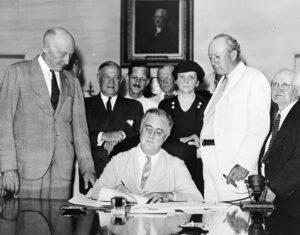Should America Consider Restarting the Civilian Conservation Corps in Response to the Economic Crash?
By AppalachianMagazine – April 3, 2020

Roughly four months ago, the world entered into a new decade and for many Americans 2020 had all the hallmarks of being an incredible year, economically speaking. The economy was booming, unemployment was at a record low and businesses were thriving — we were soaring, or so many thought. To put it lightly, many of us were oblivious of the timeless truth we learned in elementary school: What goes up, must come down.
Then came March and with it the fulfillment of the elementary proverb, we came down. Hard.
First they canceled March Madness, then they canceled schools, then there was a run on toilet paper and at last, the economy came crashing down faster than anything anyone who has studied American history had ever seen. We do not use the term “crashing down” lightly, but soberly and in recognition of the obvious: When millions of people stop working, the economy enters a tailspin.
In an interview with Yahoo Finance, KPMG’s chief economist, Constance Hunter, stated, “What is so especially sad about this is, once workers become separated from their employers, it makes it much harder to restart the economy,” adding, “We have more social safety nets in place than during the Great Depression, but this is way worse than anything we saw during the Great Depression.”
According to most recent jobs data, over 700,000 job were lost in early March, long before the international shutdown went into full effect — this number is expected to rise to reveal more than 10 million Americans have since lost their jobs.
To call this a nightmare scenario would be accurate.
“Unprecedented” is a word we keep hearing over and over again in light of everything happening, and though it is true that we have never seen such widespread economic chaos so quickly, not too long ago there was a generation that was thrown into the throes of poverty. These individuals would eventually become known as the Greatest Generation and there’s always been a lot we could learn from them — especially now.
As we collectively seek to find answers regarding the best path forward, perhaps we can look to the past, back to a moment in time that saw a booming and thriving decade come to an abrupt and painful end and was followed by years of leanness, 1929.
Three generations ago, my great-grandfather’s family was suffering in the hells of the Great Depression.
In some areas of the nation, unemployment was near 50% and I specifically remembering my late-great-grandfather, Papaw Tom, tell me about how times were so dire many people in his West Virginia community faced starvation.
Fortunately for Papaw Tom, salvation came in the form of a revolutionary governmental program known as the Civilian Conservation Corps (CCCs), a Federal work program that paid unskilled and unemployed young men $30 a month to serve in various work projects across the nation. The men were placed under supervision of the US Army and were made to learn military discipline as they lived in camps thousands of miles from home.
Upon hearing of this new program, my Papaw Tom, who was barely 15-years-old at the time, got in touch with a relative who worked for the Federal Government inside the post office in Williamson, West Virginia, and asked if there was any way he could find work in this new program.
“We were destitute — didn’t have nothing. If I didn’t get accepted into the CCC’s, I don’t know what would have happened to me or my family,” he once told me as he reminisced about what were some of the darkest days of his life, yet his most fond to recall.
Fortunately for my grandfather, his uncle assisted in forging some documents and enlisted him into the CCCs. Illegal, yes. Crooked Mingo County politics, yes. But these were extraordinary times and as we all know, extraordinary times call for extraordinary measures.
Just weeks before his death in 2014, I had the opportunity to talk with my great-grandfather about the time in his life he left West Virginia for some mysterious place he only referred to as “Out West” (click here to watch the video).
“There wasn’t a damned thing around here to do,” he recalled, using the only language he knew.
Continuing, he told about how the lieutenant “knowed damned well that I wasn’t old enough to be there.”
“I said to him, ‘please don’t send me back home because there ain’t nothing back there for me to work at.’”
To make a long story short, the fifteen-year-old boy from West Virginia soon found himself sitting atop a Caterpillar D-8 dozer learning valuable skills that would carry with him for the rest of his life.
“An ole boy rode in the seat with me and taught me how to run the thing,” my dying grandfather recalled with a twinkle in his eye. “It wasn’t very long at all until I had that big D-8 under control – I could really push the dirt…. Going into the CCCs was the best thing that ever happened to me,” he concluded.
The poor boy who left the hollers of Southern West Virginia with peach fuzz growing on his face and absolutely no marketable skill returned to the mountains of Appalachia as a man – a man capable of operating any piece of construction machinery invented by man.
Following the Second World War, he went to work constructing a home for his new family. The lessons he learned building roads and dams helped him as he graded the steep mountainside and dug a basement. The skills he picked up while building mess halls and tool rooms in the CCCs gave him the confidence and knowledge to build a house his great-great-granddaughters would celebrate Christmas inside.
He left a poor boy without any future, but would return with the knowledge necessary to lead a multimillion dollar trucking business — all with nothing more than a seventh grade education.
Not only did he benefit personally from his stint in the Civilian Conservation Corps (he received a real-life education and was able to send money back home to his destitute sisters), but the nation as a whole owes a debt of gratitude to the public work relief program: Were it not for this program, we wouldn’t have the Blue Ridge Parkway, stone walls at the Grand Canyon National Park or the Great Smoky Mountains National Park – the world’s most visited national park.
Perhaps even more important than the stone walkways at the Grand Canyon are the lasting impacts the program had upon an entire generation of young people. The CCCs offered the training ground for boys to become men and provided an opportunity for the nation to groom 3 million individuals for an impending world war – a war that would determine the fate of humanity.
Fast-forward roughly three-quarters of a century and we now find ourselves in one of the most critical moments in American, if not world history.
What will we do in the weeks and months ahead? How will we restart an economy that has come to a stop harder than the Great Depression? What does one do with 10 million unemployed people?
Perhaps even worse, what about the unfortunate high school seniors? Right now, the biggest sympathy they are getting is because they’re not going to have a prom or maybe even a graduation, but our hearts should truly break for them as they prepare to enter a workforce that frankly doesn’t need them or even want them.
Do we encourage them to become a lifelong slave of student loan debt — padding the pockets of university presidents and watching as their money is used to build even more grandiose and useless buildings on campuses across the land?
Prior to the economic catastrophe we’re on the eve of experiencing even came to light, unskilled laborers were being forced to work 2-3 jobs just to pay rent.
Sadly, millions of young kids have been deceived into running up more than $100,000 for what has turned out to be a useless degree — meanwhile, plumbers and brick masons across the land are banking three times the take home pay of many people with degrees.
Though the overwhelming majority of educators serving in our schools are giving their job everything they have (and then a little more), we must recognize that for many decades the structure of our education system has failed our kids — evidence of this is the student loan crisis that was a plague to the economy prior to March 2020.
As a child, my mother always warned me to make good grades or I’d spend my life “digging ditches”, funny enough, the guys digging ditches are the only people working right now and they’re making pretty good money.
Yes. College is necessary for many jobs. This has always been the case and will continue to be the case; however, as we wake up in April 2020 to a new economy, a way of life, even a new America, we must also get honest with ourselves: The old world is gone. There will be a new normal, though we do not yet know what that will be — we will be creating it in the weeks and months to come.
We’re still going to need someone willing to carry a bundle of shingles to the top of the library and patch the roof. Shouldn’t we be a little more concerned for the future of these people?
The dirty secret that no one wants to talk about is that our nation’s infrastructure is aging and crumbling all around us; we’re roughly a decade away from huge catastrophic disasters if we don’t get to work; meanwhile an entire generation of kids are now burdened by college debt in an economy that no longer wants them.
In an effort to cushion our fall, the federal government has stepped in and pledged to spend $2-trillion on a Coronavirus stimulus package. Two-trillion dollars, is an incomprehensible amount of money. It looks like this: $2,000,000,000,000.00. If we’re ready to pony up such an incredible amount of money to help our fall not hurt so badly, shouldn’t we be thinking about how to pick ourselves up after we’ve hit rock bottom?
I know of one West Virginian who lived through the last time the economy truly crashed (make no mistake, 2008 was a hiccup, not a crash) and if he were still alive today, he’d tell you what picked him up out of poverty: Military training, skill training, the dignity of earning one’s government check, and the pride that accompanies building something like the Blue Ridge Parkway… the Civilian Conservation Corps.
Our government has already demonstrated that the price tag is absolutely of no concern during this crisis. If this is the case, shouldn’t we consider a program that will see these dollars put to use offering real results and helping real people… for a lifetime?
Perhaps later this year, as we seek to get back on our feet, would be the perfect time for our government to consider something extraordinary, bringing back the Civilian Conservation Corps.
###


